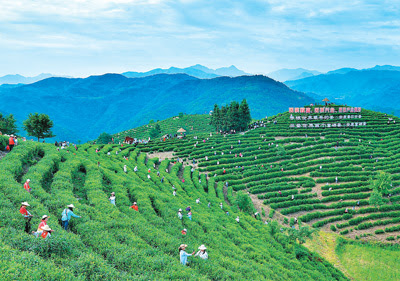Beijing: As a national-level base for turning natural resources into economic gains, Pingli county in northwest China’s Shaanxi Province has adhered to the path of giving priority to ecology and green development.
“Five years ago, General Secretary Xi Jinping stood in front of this tea tree, pointed to the green mountain opposite and said: ‘If we do not fail Nature, Nature shall never fail us,’” said Luo Xianping, then Party chief of Jiangjiaping village, Pingli county.
“Over the past five years, Jiangjiaping village has upgraded its tea gardens through measures including pruning, weeding, and applying organic fertilizer, which has both protected the ecological environment and increased income from sales of tea leaves,” Luo said.
Previously, spring tea leaves were sold for over 1,200 yuan ($164.19) per kilogram, but now the price exceeds 2,000 yuan per kilogram, Luo added.
In earlier years, Jiangjiaping village introduced a tea company to upgrade the old tea gardens and build a standardized processing factory covering an area of over 1,000 square meters with production lines for both green and black tea. By adopting a development model that combines the company, cooperatives, and farmer households, the village enabled villagers to boost their incomes through the tea industry chain.
Today, the company has developed new black tea products, transforming summer and autumn tea leaves into “valuable assets.”
“We have consistently followed the path of prioritizing ecology and green development, transforming tea areas into scenic spots, tea gardens into parks, and tea mountains into ‘gold mountains,’” said Kou Qingxin, current Party chief of Jiangjiaping village.
The village was listed as one of the most beautiful leisure villages in China in 2022 and was rated as a national 4A-level tourist attraction in 2024, attracting throngs of tourists far and wide.
Jiangjiaping village is a microcosm of Pingli county’s success in blazing a trail to prosperity by developing the tea industry. After 20 years of efforts, Pingli has made the tea sector its pillar and characteristic industry for enriching people and empowering the county.
Today, Pingli is known as the hometown of Chinese famous tea, and a tea brand in the county is recognized as a national-level geographical indication.
Currently, Pingli has built 200,000 mu (13,333 hectares) of tea gardens and 50,000 mu of five-leaf ginseng, with nearly 100,000 people engaged in related industries. The county has achieved its goal of ensuring 1 mu of tea garden per person and expanding the income for each household by an average of more than 10,000 yuan.
In recent years, Pingli county has continued enhancing ecological protection, with its forest coverage rate reaching 71.5 percent.
The water quality of exit cross-sections of rivers in the county has reached the national Level II standard, the second-highest in the five-grade ranking system. In 2024, Pingli recorded 361 days of good air quality. In addition, the county has vigorously advanced rural domestic sewage treatment, completing upgrades in 40 villages, building 44 rural domestic sewage treatment facilities, and installing 89.5 kilometers of supporting sewage pipelines. –Agencies





